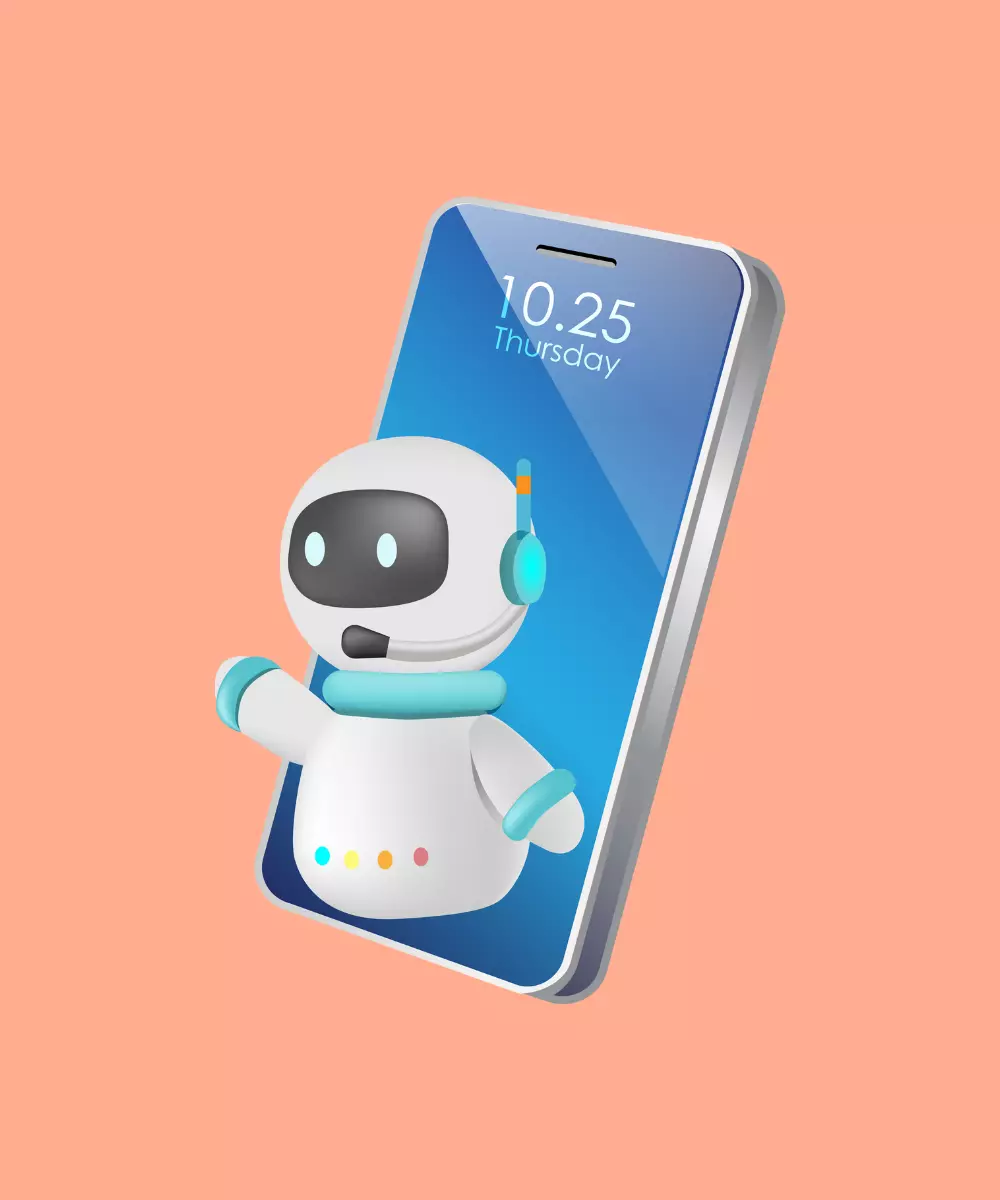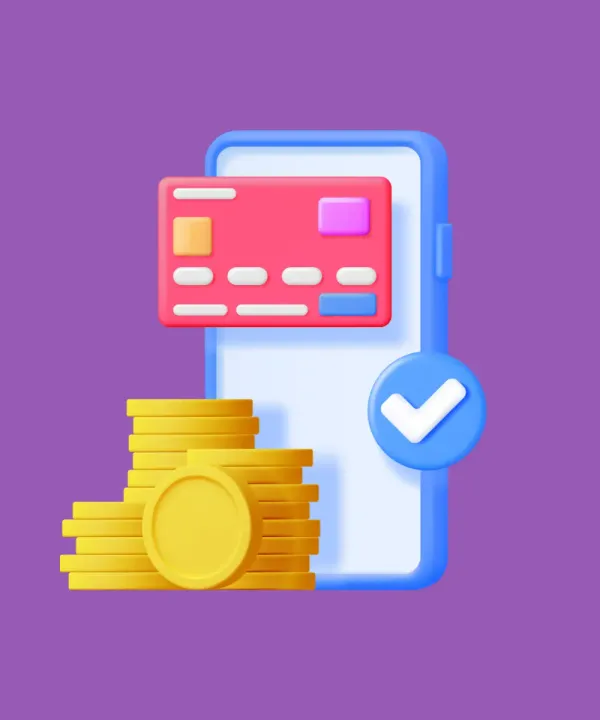As we navigate 2024, Artificial Intelligence (AI) isn't merely a technological advancement; it's a revolution reshaping the mobile app landscape. With smartphones central to our daily lives, AI-powered apps are offering experiences that are smarter and more personalized than ever before.
A glance at the market dynamics underscores the meteoric rise of AI. In 2022, the global AI market was valued at a staggering US$ 119.78 billion. By 2030, projections suggest this figure will soar to an impressive US$ 1,597.1 billion, marking an estimated CAGR of 38.1% from 2022 to 2030. Notably, North America alone accounted for a robust market size of USD 147.58 billion as of 2021.
This booming market and the undeniable influence of AI are compelling businesses worldwide to ponder a pivotal question: How can they harness this technology to craft an AI app tailored for their needs?
In this guide, we'll journey through the intricacies of AI app development, its transformative applications, the industries it's rejuvenating, and the tangible benefits it promises. Whether you're a visionary business leader, an innovative developer, or a tech-savvy consumer, this article aims to shed light on the future of mobile technology in an AI-driven world.
How Is AI Used in Mobile Apps?
The integration of AI in mobile apps has opened up a world of possibilities, making apps more intuitive, user-friendly, and efficient. Here's a deeper dive into how AI is reshaping the mobile app landscape:
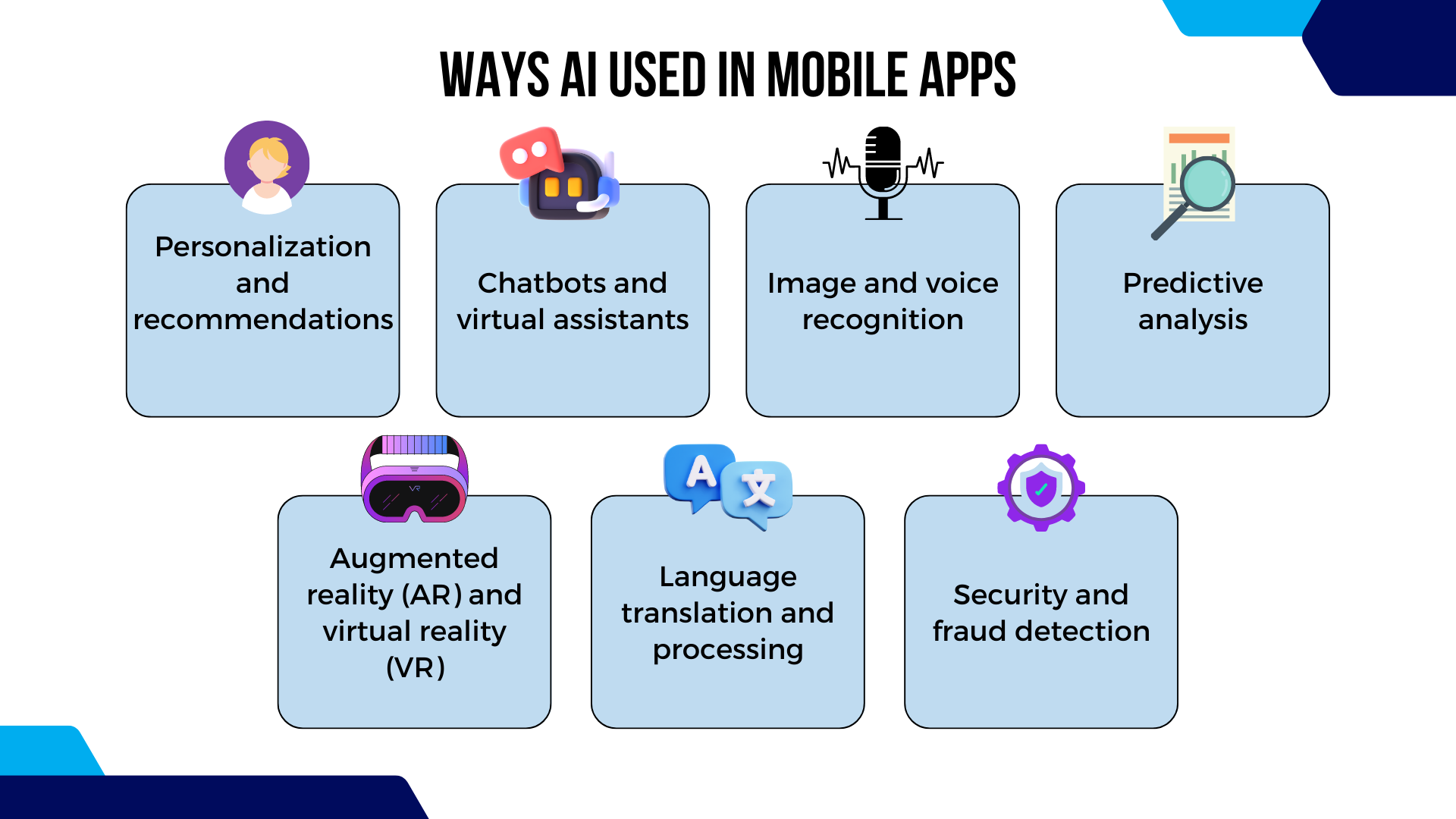
Personalization and recommendations
One of the most prominent uses of AI in mobile apps is personalization. By analyzing user behavior, preferences, and past interactions, AI algorithms can provide tailored content suggestions. For instance, streaming services like Spotify and Netflix employ AI to recommend songs, movies, or series based on a user's listening or viewing history. This ensures that users always find content aligned with their tastes, enhancing user engagement and satisfaction.
Chatbots and virtual assistants
The rise of AI-driven chatbots and virtual assistants has revolutionized customer support and user interaction. Apps with integrated chatbots can offer instant responses to user queries, book appointments, or even guide users through complex tasks. Virtual assistants like Siri, Google Assistant, and Alexa have become household names, helping users set reminders, answer questions, or control smart home devices using voice commands.
Image and voice recognition
AI-powered image and voice recognition tools have brought about groundbreaking changes in mobile apps. Apps like Shazam can identify songs from mere snippets, while others like Google Photos use image recognition to categorize and tag photos. In the medical field, certain apps employ image recognition to analyze medical images, aiding in early diagnosis and treatment recommendations.
Predictive analysis
AI's ability to analyze vast amounts of data and predict future trends is invaluable for many apps. For instance, finance apps can predict stock market trends, while health apps might forecast potential health issues based on user data. E-commerce apps utilize predictive analysis to forecast product demands, helping businesses manage inventory efficiently.
Augmented reality (AR) and virtual reality (VR)
While AR and VR are technologies in their own right, their integration with AI has led to more immersive and interactive experiences. For instance, shopping apps now allow users to virtually "try on" clothes or accessories using AR, with AI ensuring the virtual product fits and moves realistically with the user.
Language translation and processing
Apps like Google Translate have democratized language translation, breaking down communication barriers globally. AI enables real-time translation, even interpreting and transcribing spoken words into different languages. Moreover, Natural Language Processing (NLP), a subset of AI, allows apps to understand and respond to user inputs in natural, conversational language.
Security and fraud detection
In an era where security breaches are a significant concern, AI-driven security measures in apps have become crucial. By analyzing patterns and behaviors, AI can detect unusual activities, flagging potential security threats or fraudulent transactions. Banking and finance apps, in particular, rely heavily on AI to ensure user data protection and transactional security.
In conclusion, AI's integration into mobile apps is not just enhancing user experience but also redefining what apps can achieve. From personalizing content to ensuring security, AI's influence is pervasive and transformative.
Top Industries that Benefit from AI Apps
As previously noted, artificial intelligence has applications across numerous sectors. The market for AI is projected to soar to approximately $309.6 billion by 2026. If you're uncertain about the potential benefits of AI application development for your business, this section delves into how various domains are already reaping its advantages.
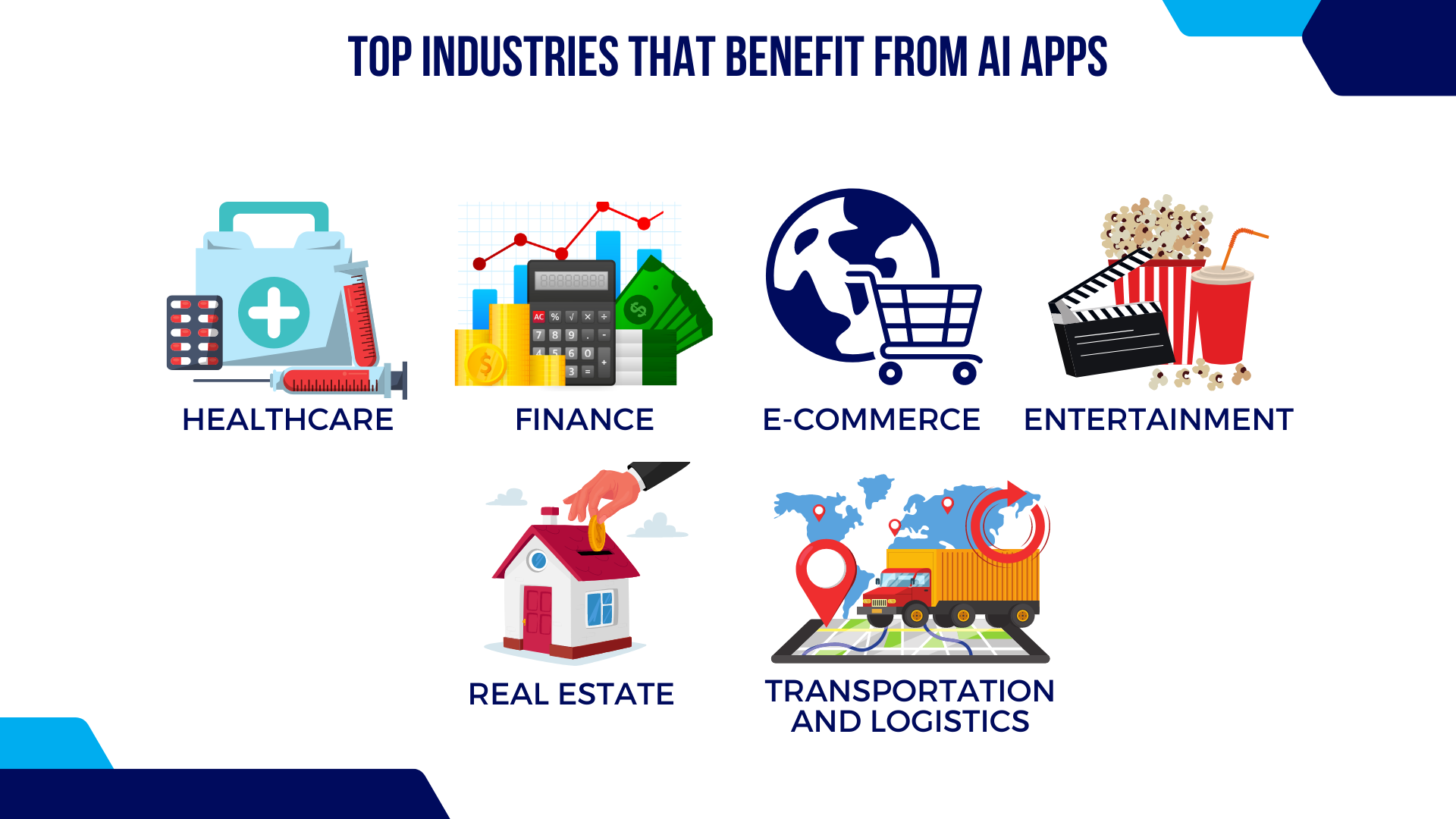
Here's a look at the industries that have been significantly impacted by the integration of AI-driven applications:
Healthcare
The healthcare industry has been a prime beneficiary of AI innovations. From streamlining administrative tasks to enhancing patient care, AI has played a pivotal role in modernizing medical practices. The ability to process vast amounts of patient data quickly allows for more informed decision-making, leading to better patient outcomes and more efficient healthcare systems.
Finance
The finance sector, with its vast troves of data, has harnessed AI for enhanced security, better decision-making, and improved customer service. The technology has been instrumental in automating routine tasks, predicting market trends, and offering personalized financial advice to clients.
E-commerce
E-commerce giants have been at the forefront of AI adoption. The technology has been crucial in understanding consumer behavior, optimizing supply chains, and personalizing shopping experiences. AI's predictive capabilities also help e-commerce platforms anticipate market shifts and adapt accordingly.
Entertainment
The entertainment industry, especially streaming services, has utilized AI to understand viewer preferences better. This has led to more personalized content recommendations, ensuring viewers always have something they'd love to watch or listen to. Moreover, AI has streamlined content production and distribution processes.
Transportation and logistics
Efficiency is the cornerstone of the transportation and logistics industry. AI has been instrumental in optimizing routes, predicting maintenance needs, and improving overall operational efficiency. The technology has also played a role in the development of autonomous vehicles, which promise to revolutionize the transportation sector.
Real estate
The real estate industry has leveraged AI to offer better insights into market trends, making the property buying and selling process more transparent. The technology has also been used to enhance virtual property tours, making property viewing more accessible and convenient for potential buyers.
In essence, while the ways AI can be applied are vast and varied, its impact on these industries is clear. Each sector has harnessed the power of AI to address specific challenges, optimize operations, and offer better services to their clients or customers.
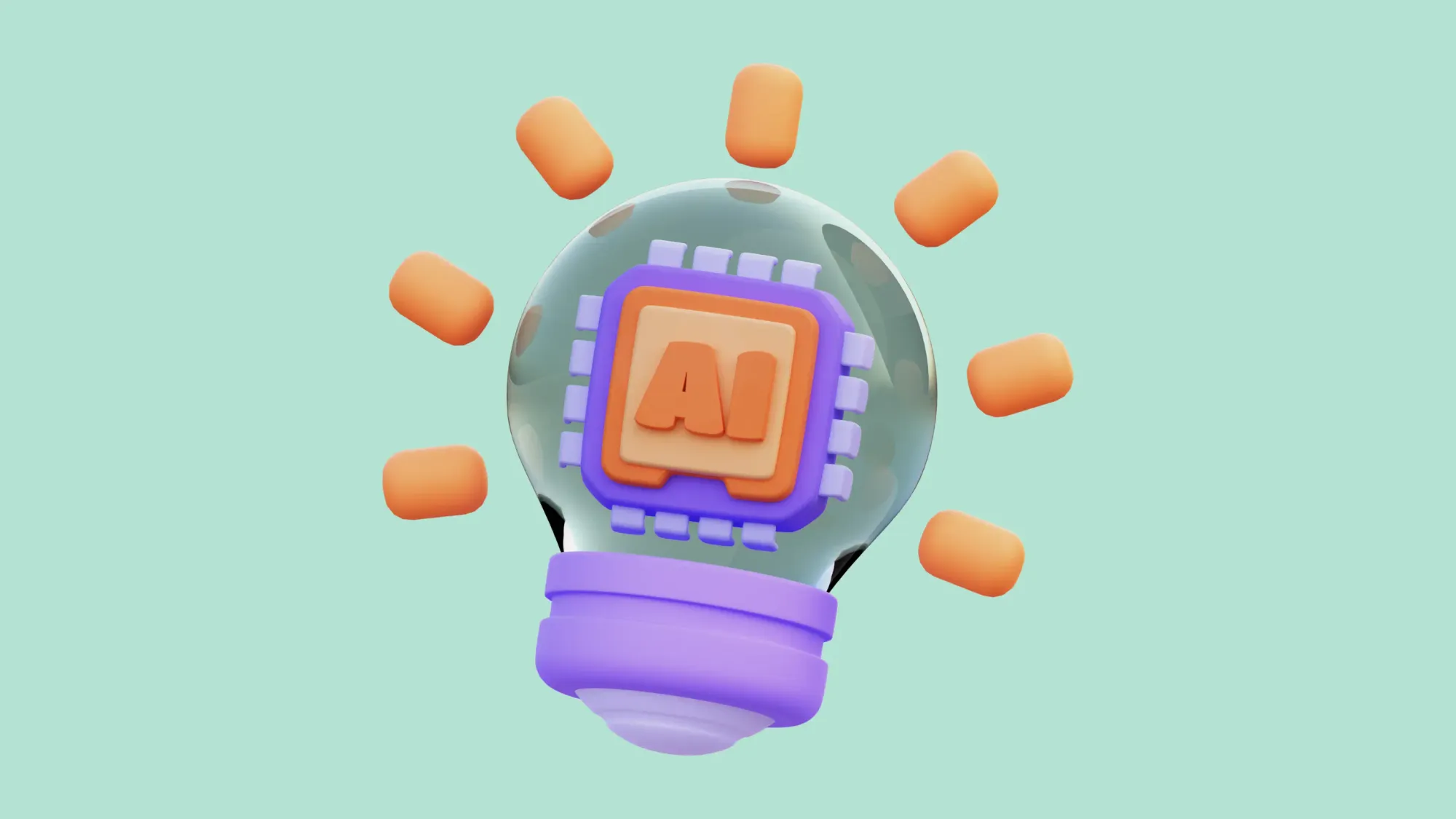
15 Best AI Mobile Apps
The integration of Artificial Intelligence (AI) into mobile apps has transformed the way we interact with technology. From personal assistants to language learning, AI-driven apps are making our lives easier, more productive, and even more entertaining. Here's a look at some of the most successful mobile apps that leverage AI:
- ChatGPT: Developed by OpenAI, ChatGPT is a conversational AI that can engage users in detailed and coherent discussions. It's designed to answer questions, assist in research, and even entertain with its vast knowledge base.
- Replika: This app is your AI friend that you can talk to anytime. It learns from your conversations, evolves over time, and provides a safe space for users to express their thoughts and feelings.
- Bing: Microsoft's search engine uses AI to enhance its search results, image recognition, and voice search capabilities, providing users with a more intuitive and personalized experience.
- FaceApp: This viral sensation uses AI-driven neural networks to transform faces in photos, allowing users to see older or younger versions of themselves, swap genders, and more.
- Otter: A game-changer for journalists, students, and professionals, Otter transcribes spoken content in real-time. It can distinguish between different speakers and even understands context, making note-taking a breeze.
- Duolingo: Revolutionizing language learning, Duolingo employs AI to personalize lesson plans, ensuring that users learn at their own pace and receive exercises tailored to their proficiency level.
- ELSA: This language learning app focuses on improving pronunciation. Using AI, it listens to users' speech and provides instant feedback, helping them perfect their accent and intonation.
- Be My Eyes: This heartwarming app connects visually impaired users with sighted volunteers. Using AI, it ensures that calls are directed to volunteers who are available and speak the same language.
- Grammarly: More than just a spell-checker, Grammarly uses AI to analyze text for grammatical errors, style inconsistencies, and even tone, ensuring that your writing is clear and effective.
- Google Assistant: Google's virtual assistant uses AI to execute voice commands, answer questions, control smart home devices, and provide personalized recommendations.
- Lensa AI: A photography app that uses AI to enhance portraits. It can automatically retouch photos, adjust lighting, and even suggest the best poses.
- Youper – CBT Therapy: Mental health is crucial, and Youper is here to help. This app uses AI to guide users through cognitive behavioral therapy sessions, helping them understand and manage their emotions.
- Swiftkey Keyboard: This keyboard app learns from your typing habits. Using AI, it predicts the next word you're likely to type, making texting faster and more efficient.
- Socratic: A boon for students, Socratic uses AI to help solve math problems, answer science questions, and provide explanations for various academic topics.
- Netflix: While primarily known as a streaming service, Netflix uses AI to analyze viewing habits and preferences, ensuring that its recommendations are spot-on for every user.
- Vivafit: Vivafit is not an ordinary fitness app with static workout plans. By using AI and computer vision technologies, it provides a new level of home fitness experience, based on dancing, fun and positive emotions.
These apps showcase the vast potential of AI in enhancing user experience across various domains. The success of these apps in the AI domain can be attributed to a combination of user engagement, positive reviews, technological innovation, and in some cases, recognition by industry peers or educational institutions.

Benefits of AI Mobile Apps for Business
The integration of AI into mobile apps has ushered in a new era of business opportunities and efficiencies. Here's a deeper exploration of the manifold benefits AI-driven apps offer to businesses:
Enhanced user experience
- Personalization: AI algorithms analyze user behavior and preferences, allowing businesses to offer tailored experiences. This personal touch can lead to increased user engagement and loyalty.
- Swift responses: AI-driven chatbots and virtual assistants ensure that customer queries are addressed promptly, enhancing overall user satisfaction.
Data-driven decision making
- Insightful analytics: AI can process vast amounts of data at unprecedented speeds, offering businesses actionable insights. This data-driven approach can inform marketing strategies, product development, and more.
- Predictive analysis: AI's ability to forecast trends allows businesses to anticipate market shifts, ensuring they're always a step ahead of competitors.
Operational efficiency
- Automation: Routine tasks, from customer support to inventory management, can be automated using AI, leading to significant time and cost savings.
- Optimized marketing: AI can analyze user interactions to determine the effectiveness of marketing campaigns, allowing businesses to refine their strategies for maximum impact.
Enhanced security
- Fraud detection: AI's real-time analysis can quickly identify unusual patterns, offering an added layer of security against fraudulent activities.
- Biometric authentication: AI-driven facial recognition or voice recognition systems provide secure and user-friendly authentication methods.
Innovative product offerings
- AI-driven features: Businesses can integrate AI-driven features into their apps, from recommendation engines to voice-activated functionalities, setting their products apart from competitors.
- Continuous improvement: AI algorithms learn and evolve over time. This means that the more users interact with an app, the better it becomes, ensuring businesses offer continually improving products.
Improved customer engagement and retention
- Relevant content delivery: AI-driven content recommendation ensures users always find relevant and engaging content, increasing app usage and retention rates.
- Interactive features: AI-driven features, like chatbots or augmented reality experiences, can make apps more interactive, ensuring users spend more time on the app.
Cost savings
- Reduced operational costs: Automation of routine tasks leads to significant cost savings in terms of manpower and time.
- Efficient resource allocation: With AI handling specific tasks, businesses can allocate resources to more strategic and value-driven activities.
In essence, AI-driven mobile apps offer businesses a competitive edge in an increasingly digital world. By enhancing user experiences, driving efficiencies, and offering innovative features, businesses can not only meet but exceed customer expectations, driving growth and profitability.
Step Guide on AI Application Development
Embarking on the journey of AI application development is both exciting and challenging. It requires a blend of technical prowess, strategic foresight, and a keen understanding of user needs.
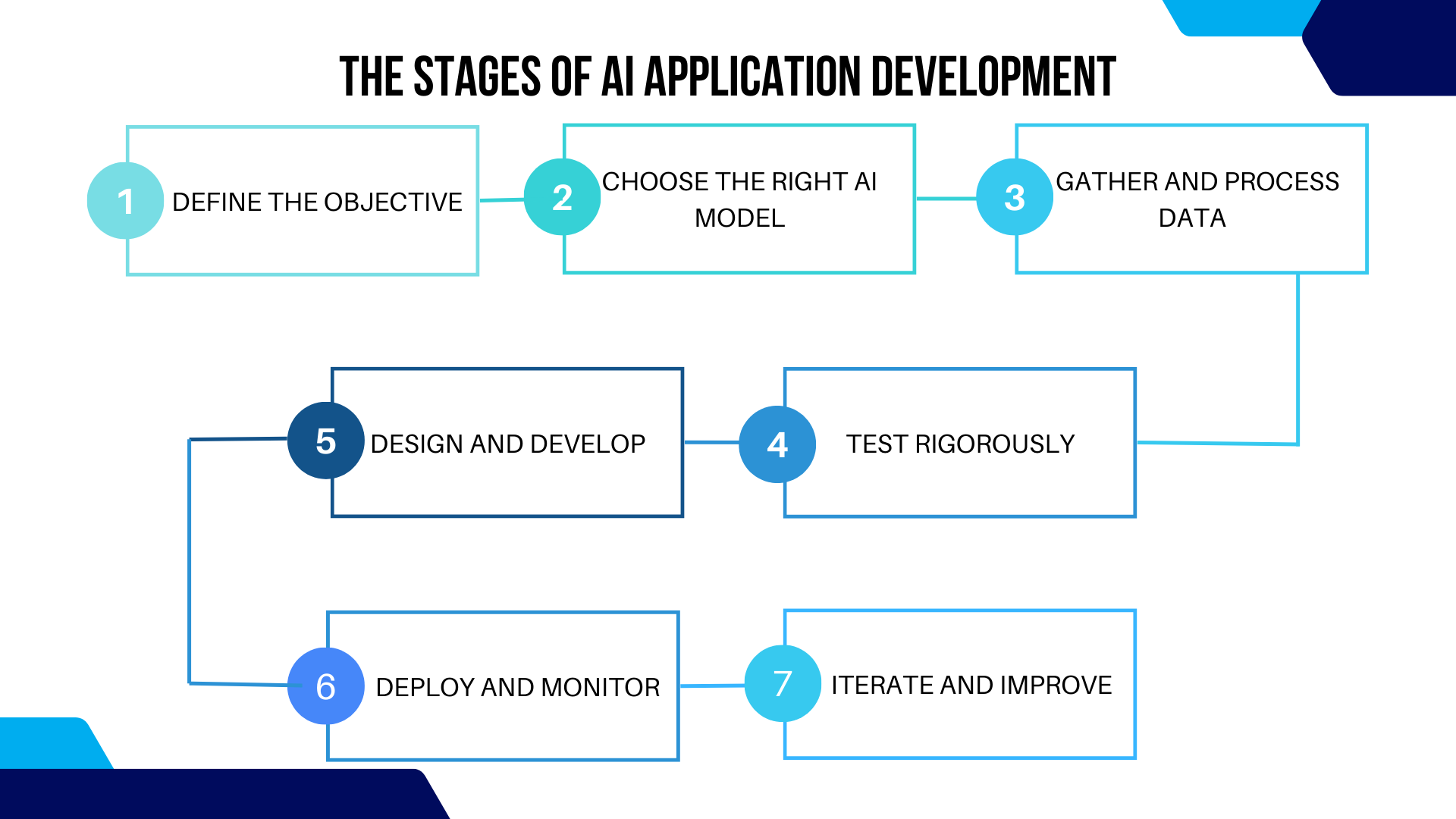
Here's a comprehensive step-by-step guide to ensure a smooth AI application development process:
Define the objective
- Problem identification: Start by pinpointing the specific challenges or gaps you aim to address with AI. This foundational clarity will guide the entire development process.
- Scope definition: Detail out the functionalities and features you envision for your AI app. This blueprint will serve as a reference throughout the development journey.
- Stakeholder alignment: Ensure all stakeholders, from developers to business leaders, are aligned with the app's objectives and expected outcomes.
Choose the right AI model
- Research and analysis: Depending on your objectives, delve into AI models like deep learning, neural networks, or natural language processing. Understand their strengths and limitations.
- Consultation: Engage with AI specialists or data scientists. Their expertise can guide you in selecting the most apt model for your objectives.
- Model prototyping: Before full-scale integration, create a prototype of the AI model to test its viability and efficiency.
Gather and process data
- Data collection: Source relevant data that the AI model will train on. This could range from user interactions to transactional data or any other pertinent dataset.
- Data cleaning: Refine the data to ensure it's consistent, relevant, and devoid of anomalies. Clean data is pivotal for the model's accuracy.
- Data annotation: For certain AI models, especially those involving image or voice recognition, data annotation might be necessary to provide context to the data.
Design and develop
- UI/UX design: Craft a user-centric interface. Given the unique capabilities of AI apps, the design should intuitively incorporate AI functionalities without overwhelming users.
- Integration: Seamlessly integrate the chosen AI model into the app's framework. Ensure efficient data processing and smooth AI operations.
- Backend development: Given the data-intensive nature of AI, robust backend infrastructure is crucial to support data storage, processing, and real-time AI functionalities.
Test rigorously
- Alpha testing: Conduct thorough internal tests to identify potential glitches, inefficiencies, or areas needing refinement.
- Beta testing: Roll out the app to a limited audience. Their feedback will provide invaluable insights into real-world performance and potential issues.
- AI model validation: Specifically test the AI model's predictions or recommendations for accuracy and relevance.
Deploy and monitor
- Launch strategy: Plan a phased launch, starting with a soft launch to gauge initial user reactions and identify any last-minute issues.
- Continuous monitoring: Use analytics tools to constantly monitor app performance, user engagement, and the accuracy of AI functionalities.
- Feedback mechanism: Implement a system for users to easily provide feedback, ensuring you receive direct insights into potential improvements or issues.
Iterate and improve
- Regular updates: With the rapid evolution of AI technology, ensure your app remains updated by integrating the latest AI advancements and refining based on user feedback.
- Scalability: As your user base grows, ensure that the app's infrastructure and the AI model can scale to handle increased data and interactions.
- Continuous learning: AI models thrive on data. As more users interact with your app, use this data to continuously train and refine your AI model, ensuring it becomes more accurate and efficient over time.
In wrapping up, AI application development is a continuous cycle of learning, iterating, and improving. By adhering to this detailed guide and maintaining a user-centric focus, businesses can unlock the immense potential of AI, offering users an unparalleled mobile experience.
How Much Does it Cost to Make an AI App?
Embarking on the journey of AI app development brings forth the inevitable question: How much will it cost? The answer, while not straightforward, can be broken down based on various factors that influence the overall budget. The intricacy of the app and the depth of AI integration play a significant role in determining the cost.
| App Complexity | Description | Cost Range |
|---|---|---|
| Basic AI apps | These are apps with typical AI functionalities. They usually use external API services, pre-trained models or very basic statistical models. Even though these applications can be great for testing AI hypothesis in some specific business domains. | $10,000 to $50,000 |
| Medium complexity apps | Falling in the mid-range, these apps might incorporate more custom fine-tuned deep learning AI models with your own datasets. Additionally, the solutions in this category usually include periodical model training pipelines, so the business can avoid problems such as concept shifts etc. | $50,000 to $150,000 |
| High-end, complex AI apps | These are the cream of the crop in the AI app world. They might involve unique deep learning architecture models, huge datasets with complex feature engineering and scalable infrastructure. For example, the only training costs for OpenAI’s GPT-4 was around $63 million. | $150,000 and above |
In wrapping up, while the figures provided offer a general overview, the nuances of each project can influence the final cost. Therefore, it's paramount to consult with a reputable app development agency. They can assess your specific requirements, objectives, and desired functionalities to provide a precise and tailored estimate.
Conclusion
The integration of AI into mobile apps is undeniably one of the most transformative advancements in the digital realm. As we've explored, its applications span across industries, enhancing user experiences, optimizing business operations, and paving the way for innovative solutions that were once the stuff of science fiction.
The cost of developing such apps, while varied, is an investment in the future. As businesses and consumers increasingly lean towards personalized, efficient, and intelligent digital interactions, AI-driven apps stand at the forefront of this revolution. They not only cater to current market demands but also anticipate and shape future trends.
As we look ahead, the fusion of AI with mobile apps promises a landscape where technology continually adapts, learns, and evolves to meet user needs. It's an exciting horizon, and for businesses and developers alike, the journey has only just begun.
At What the Flutter, we specialize in cross-platform app development, seamlessly integrating AI functionalities tailored to your business needs. Our team of experts is here to guide you through every step, ensuring your app not only meets but exceeds expectations. Dive into the future of mobile apps with us. Contact us today to kickstart your AI app development journey!


